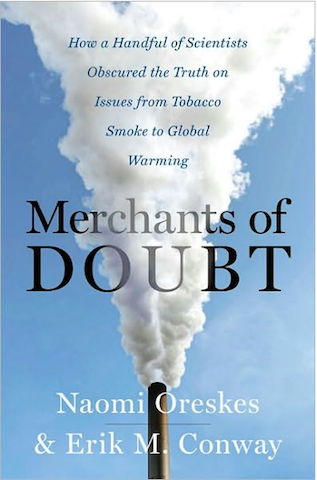No doubt
January 15, 2011 at 9:06 PM by Dr. Drang
When I went into my office Monday morning this episode of ABC Radio National’s The Science Show was sitting in iTunes, waiting to be synced. I do like The Science Show, but during the winter, when I’m not commuting by bicycle, the time I spend listening to podcasts is shortened and many episodes get the fast forward treatment. This one, though, I listened to twice.
It’s the recording of a talk given by Naomi Oreskes, a historian of science at the University of California, San Diego, in support of her recent book with Erik Conway, Merchants of Doubt: How a Handful of Scientists Obscured the Truth on Issues from Tobacco Smoke to Global Warming.1
Although the book also covers acid rain, secondhand smoke, the hole in the ozone layer and DDT, Oreskes’ talk is mostly about global warming and the means by which a dedicated group of politically motivated scientists2 manufactured doubt about it.3
I listened to it a second time because it was so well done. Oreskes is not, by any conventional measure, a great speaker; her voice isn’t mellifluous, her few jokes are perfunctory and not particularly funny, and she doesn’t put on a multimedia show. Instead she uses the traditional rhetorical tools of organization and logical progression to make a devastating argument. If you have any interest in persuasive speaking or writing, you owe it to yourself to listen at least once.
A couple of days ago The Science Show added a transcript of the talk to the episode’s web page. If you’re really pressed for time, you could just read it, but listening is better because it was written as a talk, not an essay. The transcript is better thought of as a reference.
After listening the first time, I went to my library’s web site and put a hold on Merchants of Doubt. After hearing the the condensed version, I want to get the whole story.
-
There must be study somewhere of the use of colons in nonfiction titles, especially in books written by academics for the general public. The formula is simple.
Punchy Title: Long Subtitle in Which I Get Serious and Explain What the Book is Really About
Typically, the punchy title is a pun or a reference to pop culture. The subtitle is often what the title would have been if the work were intended for specialists only. Because the formula is so widely used by academics, journalists and other non-experts often use it to give their hackwork a veneer of respectibility. ↩
-
Yes, scientists. I have a tendency to think of global warming deniers as purely political operators and writers-for-hire at conservative think tanks, but Oreskes shows that the origins of global warming denial were with a small group of real scientists—not climate scientists, but scientists nonetheless. Their political motivations weren’t based on the simple Republican/Democrat split that dominates most American political discussion, but came from a deep free-market fundamentalism that seems to have arisen from their work for the Department of Defense during the Cold War. ↩
-
Is it a coincidence that a post about an academic talk has many long footnotes? ↩

